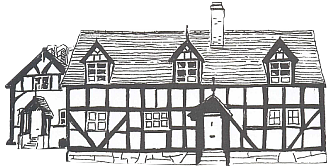Staying Connected
“Staying Connected” was the title of a meeting held on Friday 11 March 2016 at the Lyon Hall, to inform local people about two projects aimed at helping those in danger of becoming socially isolated to maintain links and stay connected within their own communities.
Although a community bus service and and a local befriending scheme may not appear to have much in common, it became apparent that the benefits of both are similar. If your driving licence is suddenly revoked on health grounds or you are no longer able to get out and about due to reduced bus services, you may begin to lose touch with people and the community you were once part of. Likewise, if you become frail or housebound due to long-term illness, you may feel very cut off and lonely.
 As Paul Cronin of the Severn Hospice pointed out in his introduction to Compassionate Communities, a scheme which the Hospice have already helped 14 Shropshire communities to implement, the two most frequent answers to the question, “What would make the most difference to your quality of life?” were surprisingly straightforward. “It would be nice if someone called in to see me,” and “ There is no public transport, so I can’t get out to see people any longer.”
As Paul Cronin of the Severn Hospice pointed out in his introduction to Compassionate Communities, a scheme which the Hospice have already helped 14 Shropshire communities to implement, the two most frequent answers to the question, “What would make the most difference to your quality of life?” were surprisingly straightforward. “It would be nice if someone called in to see me,” and “ There is no public transport, so I can’t get out to see people any longer.”
Mr Cronin showed how chronic social isolation can lead to crushing loneliness and then to crisis, noted in virtually every medical practice in the county. How encouraging then to hear of a reduction in several measures (see below) of health service uptake once trained Co-Co volunteers became involved in a person’s life, visiting or phoning them regularly, sharing their interests and generally helping them to re-connect with their community. For further information see here.
 John Harrison of North Salop Wheelers explained how their group had begun to provide regular market day services for a few villages in the Wem area back in 2003. Wheelers have expanded steadily to cope with demand and now run services on 4 days of the week for Ellesmere, Market Drayton, Wem and Whitchurch. With further cuts to bus services, they find themselves fully stretched and in great need of help with administration, fund-raising and driving. [At present they do not have any requests for transport from people living in the Hodnet area, but would seek to respond positively should they be approached in the future.] For more information, phone 01948 880037 or see here.
John Harrison of North Salop Wheelers explained how their group had begun to provide regular market day services for a few villages in the Wem area back in 2003. Wheelers have expanded steadily to cope with demand and now run services on 4 days of the week for Ellesmere, Market Drayton, Wem and Whitchurch. With further cuts to bus services, they find themselves fully stretched and in great need of help with administration, fund-raising and driving. [At present they do not have any requests for transport from people living in the Hodnet area, but would seek to respond positively should they be approached in the future.] For more information, phone 01948 880037 or see here.
The meeting concluded with an opportunity for people to sign up for further involvement in both schemes.
If you were not at the meeting but would like to offer your time and involvement in either project after reading this report, it’s not too late. Please email and someone will be in touch with you.
Due to a technical problem Paul Cronin was unable to show a PowerPoint presentation. Since then he has kindly supplied us with a copy of it and you can view the slides below. Of particular note are the five slides showing how demands on the Health Service were reduced after the initial Co-Co scheme was put in place. These are:
- Home visits to participants reduced by just over a third;
- Phone calls between doctors and participants reduced by a quarter;
- Visits to A & E Units halved;
- Emergency hospital admissions lowered by a third;
- Contact with Shropdoc also reduced by a third.












